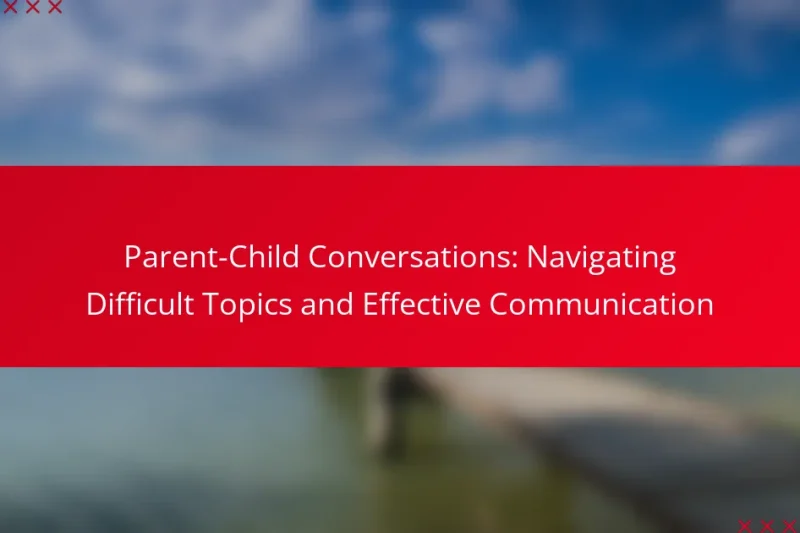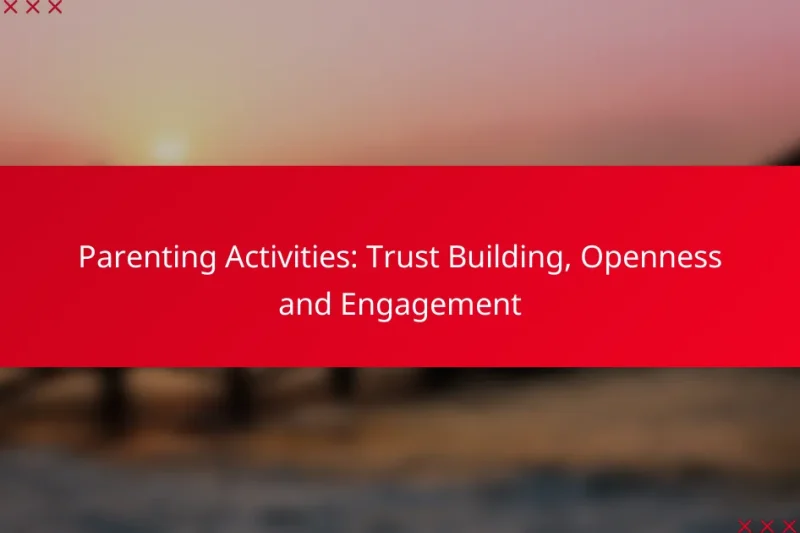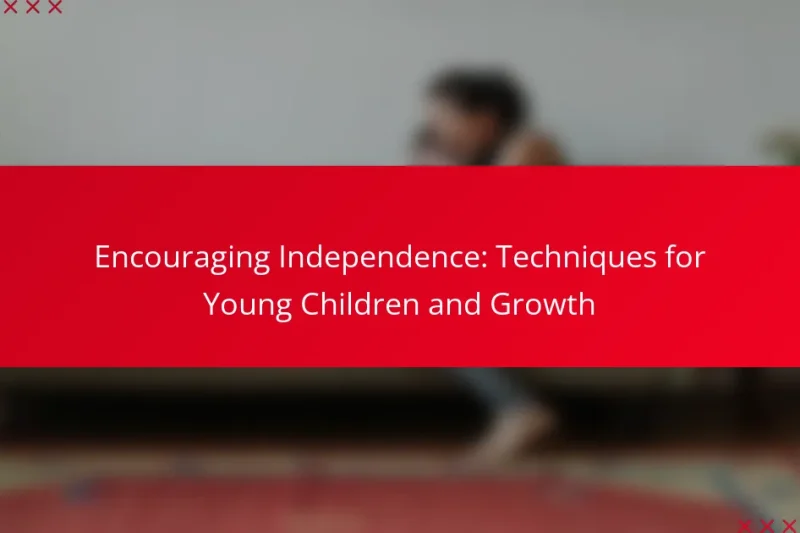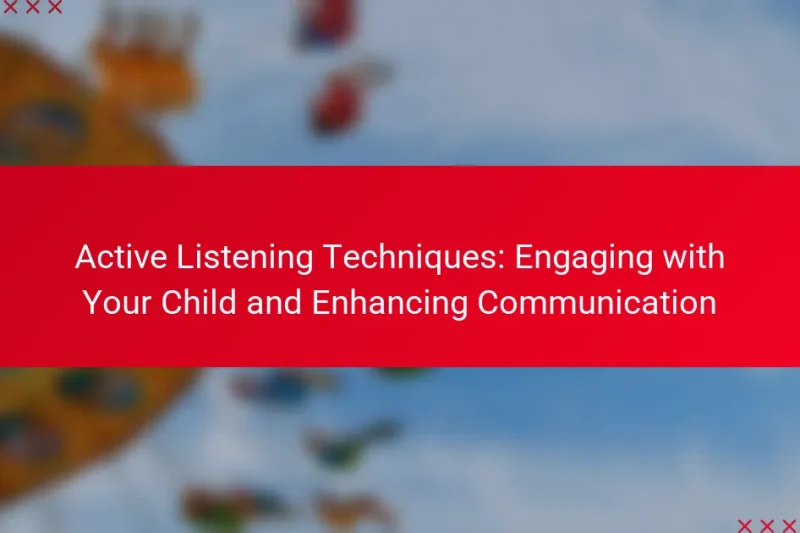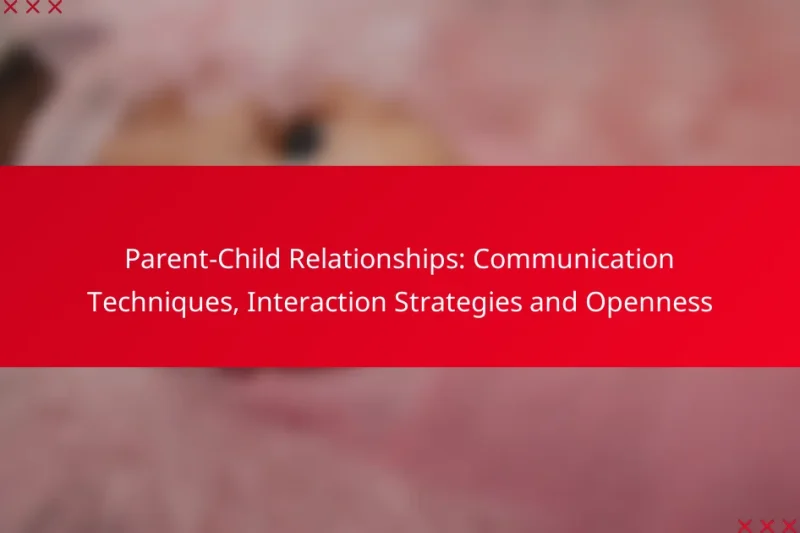Parent-child relationships thrive on effective bonding techniques, communication skills, and trust-building practices. Engaging in shared activities … Parent-Child Relationships: Bonding Techniques, Communication Skills and Trust BuildingRead more
Building Strong Parent-Child Relationships
Building strong parent-child relationships is essential for fostering trust and understanding within the family. By prioritizing open communication, quality time, and emotional intelligence, parents can create a supportive environment that encourages their children to thrive. Engaging in shared activities not only strengthens bonds but also creates lasting memories that enhance emotional connections.
Parent-Child Conversations: Navigating Difficult Topics and Effective Communication
Navigating difficult conversations with children requires sensitivity and openness from parents. By employing effective communication strategies … Parent-Child Conversations: Navigating Difficult Topics and Effective CommunicationRead more
Parenting Activities: Trust Building, Openness and Engagement
Effective parenting activities play a crucial role in building trust and fostering openness between parents and … Parenting Activities: Trust Building, Openness and EngagementRead more
Parenting Activities: Trust Building, Openness and Engagement
Effective parenting activities play a crucial role in building trust and fostering openness between parents and … Parenting Activities: Trust Building, Openness and EngagementRead more
Encouraging Independence: Techniques for Young Children and Growth
Encouraging independence in young children is vital for their growth and development. By providing opportunities for … Encouraging Independence: Techniques for Young Children and GrowthRead more
Family Time Strategies: Budget-Friendly Activities and Quality Engagement
Finding budget-friendly activities for family time can enhance connections and create lasting memories without straining your … Family Time Strategies: Budget-Friendly Activities and Quality EngagementRead more
Active Listening Techniques: Engaging with Your Child and Enhancing Communication
Active listening is a crucial skill for parents aiming to enhance communication with their children. By … Active Listening Techniques: Engaging with Your Child and Enhancing CommunicationRead more
Parent-Child Relationships: Communication Techniques, Interaction Strategies and Openness
Effective communication is vital for nurturing strong parent-child relationships, as it fosters understanding and openness. By … Parent-Child Relationships: Communication Techniques, Interaction Strategies and OpennessRead more
How can parents strengthen relationships with their children?
Parents can strengthen relationships with their children by fostering open communication, spending quality time together, and practicing active listening. These strategies help build trust and understanding, creating a supportive environment for children to thrive.
Open communication
Open communication involves sharing thoughts and feelings honestly and encouraging children to express themselves. Parents should create a safe space where children feel comfortable discussing their concerns and experiences without fear of judgment.
To promote open communication, parents can ask open-ended questions and show genuine interest in their child’s daily life. Regular check-ins can help maintain this dialogue, ensuring that children know their voices are valued.
Quality time together
Spending quality time together strengthens the parent-child bond. This can include family activities, such as playing games, cooking, or going for walks, which foster connection and shared experiences.
It’s essential to prioritize regular family time, aiming for at least a few hours each week. Engaging in activities that both parents and children enjoy can make these moments more meaningful and memorable.
Active listening techniques
Active listening is crucial for understanding children’s needs and feelings. This technique involves fully concentrating on what the child is saying, acknowledging their emotions, and responding thoughtfully.
Parents can practice active listening by maintaining eye contact, nodding, and summarizing what their child has said to show comprehension. Avoiding interruptions and giving children time to express themselves is key to effective communication.
Establishing trust
Establishing trust is fundamental for a healthy parent-child relationship. Trust is built through consistency, reliability, and honesty in interactions. When children know they can rely on their parents, they feel secure and valued.
To foster trust, parents should follow through on promises and be transparent about their expectations. Encouraging children to share their thoughts and feelings without fear of repercussions also strengthens this trust.
Setting boundaries
Setting boundaries helps children understand acceptable behavior and fosters a sense of security. Clear and consistent boundaries provide children with guidelines to navigate their environment safely and responsibly.
Parents should communicate boundaries clearly and explain the reasons behind them. It’s important to enforce these boundaries consistently while allowing room for discussion, helping children learn the importance of respect and responsibility.
What activities promote bonding between parents and children?
Engaging in shared activities is essential for fostering strong bonds between parents and children. These interactions create lasting memories and enhance emotional connections.
Family game nights
Family game nights are a fun way to promote bonding through friendly competition and teamwork. Choose games that cater to all ages, ensuring everyone can participate and enjoy the experience.
Consider a mix of board games, card games, and video games to keep things fresh. Aim for a weekly or bi-weekly schedule to establish a routine that everyone looks forward to.
Outdoor adventures
Outdoor adventures provide opportunities for exploration and physical activity, which can strengthen family ties. Activities like hiking, biking, or visiting local parks allow families to connect with nature while spending quality time together.
Plan outings that suit your family’s interests and fitness levels. Even short trips to nearby nature reserves can be enriching, so aim for at least one outdoor adventure each month.
Cooking together
Cooking together is a practical way to bond while teaching children valuable life skills. Involve kids in meal preparation, from selecting recipes to measuring ingredients, fostering teamwork and communication.
Try to incorporate cultural dishes or family recipes to make the experience more meaningful. Aim for a weekly cooking session, allowing children to take turns choosing the menu to keep them engaged.
What role does emotional intelligence play in parenting?
Emotional intelligence is crucial in parenting as it helps parents understand and manage their own emotions while also recognizing and responding to their children’s feelings. This skill fosters stronger connections and promotes healthier communication within the family.
Understanding children’s feelings
Understanding children’s feelings involves recognizing their emotional states and validating their experiences. Parents should pay attention to verbal and non-verbal cues, such as facial expressions and body language, to gauge how their child is feeling. This awareness allows parents to respond appropriately and supportively.
For example, if a child is upset after losing a game, acknowledging their disappointment can help them feel heard and understood. This validation can strengthen the parent-child bond and encourage open communication.
Modeling empathy
Modeling empathy means demonstrating understanding and compassion in everyday interactions. Parents can show empathy by actively listening to their children and expressing their own feelings in relatable ways. This behavior teaches children how to empathize with others and navigate their own emotions.
For instance, when a child shares a problem, a parent can respond with, “I understand how that feels; I felt the same way when I faced a similar situation.” This approach not only validates the child’s feelings but also illustrates empathetic behavior.
Encouraging emotional expression
Encouraging emotional expression involves creating a safe environment where children feel comfortable sharing their feelings. Parents should promote open discussions about emotions and provide language to help children articulate their experiences. This practice can enhance emotional literacy and resilience.
Parents can use tools like emotion charts or storytelling to help children identify and express their feelings. For example, asking questions like, “What made you feel happy today?” or “How did that situation make you feel?” can facilitate meaningful conversations about emotions.
How can parents address conflicts effectively?
Parents can address conflicts effectively by employing clear communication and conflict resolution strategies. Understanding the underlying issues and maintaining a calm demeanor are essential for resolving disagreements constructively.
Using conflict resolution strategies
Implementing conflict resolution strategies involves identifying the root cause of the disagreement and working collaboratively to find a solution. Techniques such as active listening, where each party expresses their feelings without interruption, can foster understanding.
Consider using a structured approach, like the “I” statements method, where parents express their feelings by starting sentences with “I feel” rather than “You always.” This reduces defensiveness and encourages open dialogue.
Staying calm during disagreements
Maintaining composure during disagreements is crucial for effective conflict resolution. Parents should take deep breaths and pause before responding to avoid escalating tensions. A calm tone can help de-escalate the situation and promote a more productive discussion.
It’s helpful to set ground rules for discussions, such as no yelling or name-calling, to create a safe environment for expressing feelings. Taking breaks if emotions run high can also prevent conflicts from worsening.
Finding common ground
Finding common ground is essential for resolving conflicts and strengthening parent-child relationships. Parents should identify shared goals or interests that can serve as a foundation for compromise. This could involve discussing family values or mutual desires, such as wanting to spend quality time together.
Encouraging children to express their viewpoints and validating their feelings can help in reaching a consensus. Techniques like brainstorming solutions together can also foster collaboration and reinforce the bond between parents and children.
What are the signs of a healthy parent-child relationship?
A healthy parent-child relationship is characterized by trust, communication, and emotional support. Signs include mutual respect, open dialogue, and a strong emotional connection that fosters growth and independence.
Mutual respect
Mutual respect in a parent-child relationship means valuing each other’s opinions, feelings, and boundaries. Parents should acknowledge their child’s individuality and encourage them to express themselves without fear of judgment.
To cultivate mutual respect, parents can practice active listening and validate their child’s experiences. Simple actions like asking for their input on family decisions can reinforce this respect and strengthen the bond.
Open dialogue
Open dialogue refers to the ability to communicate freely and honestly about thoughts and feelings. This type of communication helps children feel safe discussing their concerns and aspirations with their parents.
Encouraging open dialogue can be achieved by setting aside regular time for conversations, such as during family meals or walks. Parents should create a non-judgmental environment where children feel comfortable sharing their thoughts, which fosters trust and understanding.

